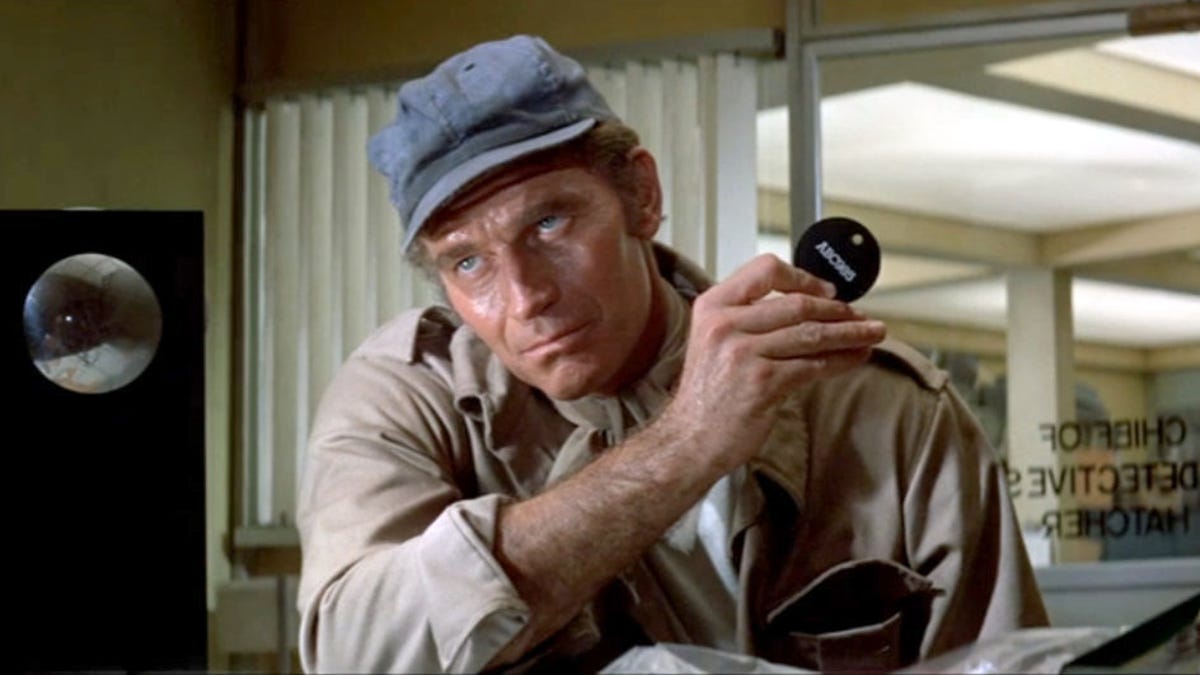Soylent Green predicted a grim 2022. What did the dystopian movie get right?
The 1973 classic imagined a world wracked by climate change and food shortages. Parts of the bleak movie hit uncomfortably close to home.
"Soylent Green is peeeeeooooople!" I've used that phrase as a punchline for too many casual jokes over the years. Mystery food in a cafeteria? "It's people!" Mushy peas on a visit to England? "It's people!" But I'd never actually seen the 1973 movie that spawned that infamous catchphrase. Until now. Soylent Green is set in 2022, and as the year begins, I wanted to know just how closely the film's dystopian fiction anticipated our current reality.
I was prepared for a campy movie, and there are some aspects of that in the extremely '70s set design and costumes, with Charlton Heston as a New York City police detective running around in what looks like a beige prototype of a Members Only jacket. But I found a movie that takes itself extremely seriously and presents a mishmash of dystopian fantasy, hard-boiled detective tropes and virulent misogyny.
Soylent Green's vision of the future is grim. There's been a mostly unexplained worldwide ecological disaster involving rampant global warming. Water is scarce. The oceans are dying. Forty million people are crowded into a heat-blasted New York City packed with broken-down cars, families sleeping on staircases and churches filled with the sick and indigent. There isn't enough food to go around, so the poor eat waferlike food substitutes called soylent while the rich live in air-conditioned high-rise apartments and get access to luxury items like celery sticks.
There's nobody to root for, except for Edward G. Robinson as police analyst Sol Roth and the women in the film, most of whom are literally called "furniture" but aren't given even a modicum of character development. Heston's Frank Thorn is so tipped over to the anti side of the anti-hero spectrum he's impossible to like. He swaggers around, treats women with casual cruelty and fails to grow as a person at any point in the story.
In Soylent Green, women are "furniture" that stay with their apartments, just like couches or tables.
But enough with the film criticism, I came here to weigh this movie against our own 2022. Did it get anything right? The Ken Burns-meets-Koyaanisqatsi intro of photographic images promises a movie with something to say about society and our treatment of the planet, but it never really dives into those concepts other than to show the brutal results of environmental collapse through the dirty, overcrowded microcosm of New York City.
There are scenes of people (some of whom are wearing masks, presumably due to pollution) driven to despair and battling against a militarized police force. The masks trigger uneasy visions of our current coronavirus pandemic, but this film isn't about a virus. Soon, big bulldozers show up to give us an endless montage of humans being scooped up and deposited like waste into trucks. It's not subtle.
Soylent Green takes a giant misstep with the near-total erasure of women. It's a man's-man's manly world where Thorn shows no hesitation in using women as objects. Screw that guy, was my response. In our 2022, Greta Thunberg is a leading voice for the environment, we have Kamala Harris as vice president in the US and Katherine Calvin is NASA's new chief scientist and senior climate adviser.
Soylent Green is not made from plankton.
The most 2022-resonant notes in the film are connected to the way it shows a catastrophic collapse of a society that's choked out nature, keeps its last few scraggly trees inside a tent in Gramercy Park, and can no longer provide for its residents. The most poignant scene is Roth's death by euthanasia, which plays out to gorgeous wide-screen videos of deer, ocean waves, sunsets and fish set to light classical music. This is one of the few moments when the threats we currently face due to the climate crisis feel real within the confines of the movie. It's a reminder of all that we could lose if we don't work harder to save our planet.
To be fair, Soylent Green was right to warn of the dangers of global warming all the way back in the early 1970s. It just failed to capitalize on the concept as anything other than a backdrop for the twist ending that soylent green isn't made from plankton -- it's made from human bodies.
When it comes to finding relevance to and resonance with our lives in 2022, you might do better to look to Netflix's Don't Look Up as an allegory for human apathy in the face of impending disaster. If the climate crisis were an asteroid with a due date, there might be a lot more urgency around addressing it.
I wanted to laugh at Soylent Green. I wanted to absorb profound lessons about our current world. But really I was just happy to reach the end and see sweaty Heston get hauled away, shouting, "Soylent green is people!" to people who won't listen because they've got more pressing concerns, like bare-bones survival in a broken world. Maybe that's the most relevant idea here. Sometimes, when things are messed up, all you can do is scream into the void.


